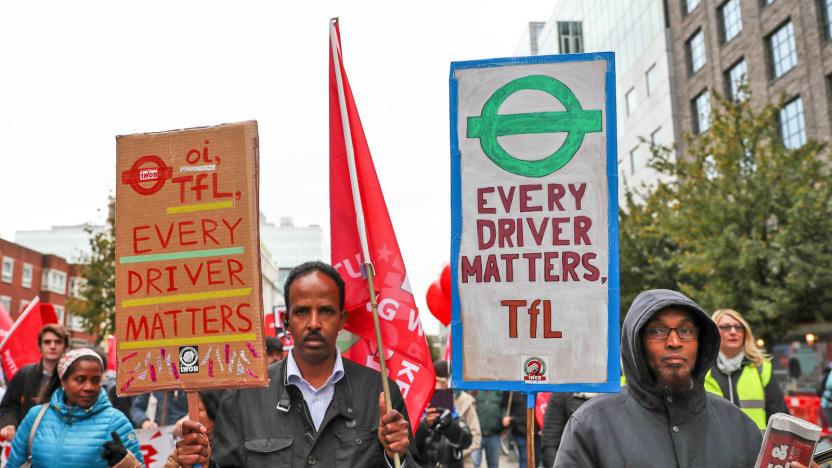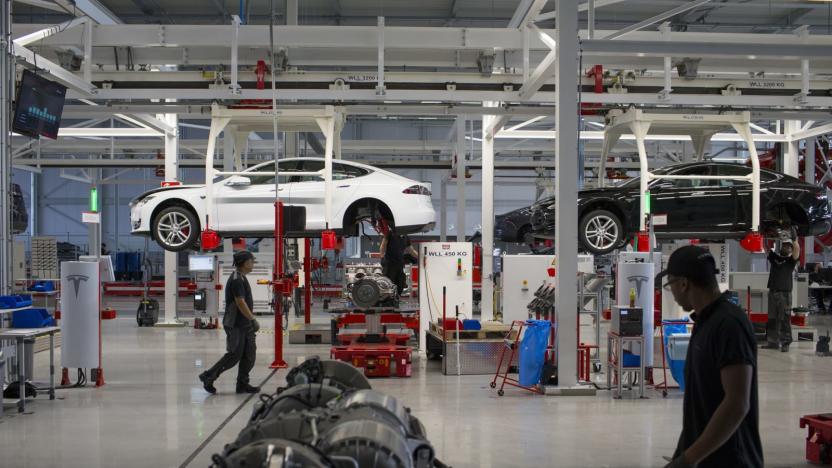workersrights
Latest

Uber's fight over worker status is headed to the UK Supreme Court
Uber is about to face a definitive battle over its classification of ridesharing drivers. The UK Court of Appeal has upheld a 2016 ruling that Uber drivers are considered employees and thus qualify for holiday pay, the minimum wage and other protections. As Uber told Wired it planned to appeal the decision in the country's Supreme Court, the company now faces a definitive battle over worker status.

Tesla hit with unfair labor complaint from US watchdog
The US National Labor Relations Board (NLRB) has filed a complaint against Tesla after investigating workers' complaints over unfair labor practices. Workers said Tesla "coerces and intimidates" them via a confidentiality agreement that illegally prevents them from discussing labor conditions and unionization.

Amazon's Mechanical Turk workers want to be treated like humans
Amazon's Mechanical Turk service is all about using humans to perform computer-like tasks, such as identifying objects and transcribing videos. However, those workers are tired of being treated like automatons -- they've launched an email campaign urging Amazon chief Jeff Bezos to market Mechanical Turk staff as the humans they are. Ideally, they'd be treated as "skilled, flexible" people with real identities, not just as tools for time-conscious customers. They're hoping for a public response from Bezos, and also want to shake off stereotypes of Turkers as unskilled or working solely for "beer money."

Apple's suppliers hit 99% work-hour compliance
Like virtually every other hardware manufacturer on the planet, Apple uses factories and workers in China to manufacture its hardware products. However given that China's worker rights and safety requirements are often less than they are in other developed nations, the public eye has turned towards the big tech companies to make sure that their suppliers' employees are being treated fairly and ethically. With that in mind, Apple has published a Supplier Work-Hour Compliance report since January 2012, which tracks more than 1 million supplier employees to ensure they are not working over 60 hours a week on average. This week Apple updated the report and said that its suppliers hit a new high last January, with 99 percent of workers falling within the 60 hours or less work week for the month. The 99 percent rate comes off a low of an 87 percent compliance rate in September and November 2012. During those months, manufacturing ramped up to support the iPhone 5 and the holiday shopping season, respectively.

Improvements at Foxconn's China factory
Foxconn has been under the microscope due to excessive overtime and poor working conditions at its Chinese production facilities. A report in the New York Times suggests the company is making changes that'll improve the workplace for its 1.4 million employees in China. These improvements include less overtime, pay increases and improved working conditions. The report chronicles Pu Xiaolan, a migrant worker from Sichuan province who has benefitted from Foxconn's worker-friendlier policies. She previously had a chair to helps her with her work inspecting iPad cases, but it didn't have back support. She would end her shift so sore that she had difficulty sleeping. Pu says she now has a wooden chair with a high, sturdy back that eases the strain on her back. She has even heard of some employees getting chairs with cushions. Apple's influence on Foxconn and its increasingly prominent role in worker's rights is also highlighted in the New York Times article. Human rights groups hope the Cupertino company will continue to focus on improving conditions for factory workers overseas. Many believe Apple has the public stature to initiate major changes in the way assembly workers are treated in the workplace. These improvements would not be limited to Foxconn, they could ripple throughout the entire electronics manufacturing industry. You can read the full article about Apple, Foxconn and working conditions on the New York Times' website.

Marketplace's Rob Schmitz interviews Foxconn workers, shows how an iPad is made
Marketplace reporter Rob Schmitz visited a Foxconn factory in Shenzhen, China. In the latest report in an on-going series, Schmitz talks to the workers and re-tells their stories. Many employees talk about overbearing supervisors and the extreme poverty faced by the Chinese people in the rural parts of the country. Schmitz also films one of the first videos seen outside Foxconn that shows how an iPad is assembled by a combination of robots and humans.

Group looking to form Apple Retail Workers Union
Today, we received an email from an organization calling itself the Apple Retail Workers Union. The organization is trying to garner enough support among Apple retail employees to unionize. From the email: On May 19, 2001, Apple opened the doors to its first retail stores. It encouraged people to "shop different." Ten years later, the people of Apple are coming together to "work different." We are launching today to get fellow employees, shoppers, and the world know that we work in one of the most demanding retail environments while suffering through unfair treatment and compensation among many other various issues. We deserve better. Our time has come. This campaign is by and for the workers of Apple's retail stores in the United States. A spokesperson for the ARWU told Macworld that employees from "some stores in the Pacific Northwest may be talking amongst themselves" about forming a union, and that "an attempt at [the] Alderwood store... is the closest anyone has come to collective action" at Apple's retail stores. The spokesman, who wished to remain anonymous, works at an Apple store "in the Bay area" and said the "unfair treatment" it cited in its email "included break schedules, training opportunities, the selection and hiring process for internal candidates for open positions, and wages," according to Macworld. With all the demonizing of unions going on right now, it's probably not the best time for the fledgling ARWU to attempt this, but hey, at least they're giving it a go in the Pacific Northwest first and not in more hostile places, such as Wisconsin.

National Labor Committee report on Chinese CE factories uncovers deplorable conditions
Yesterday, the National Labor Committee produced a report on the working conditions at the KYE Factory in Dongguan City, Guangdong, China. KYE operates (like many factories in China) a live-work facility and generated sales of $400 million in 2008. KYE manufactures outsourced products for HP, Best Buy, Samsung, Foxconn, Acer, Logitech, and ASUS. Their largest customer, however, is reportedly Microsoft. The report details some of what we've come to expect in stories of labor abuses -- near children, most of them women, working for 16 or 17 hours a day, living in nearly deplorable conditions, for less than a dollar an hour -- all so that the world's ever-growing need for / addiction to consumer electronics can be fed. Now, the gadget industry isn't the only offender by a stretch -- but it's quickly becoming one of the largest (in addition to producing a truly horrific amount of toxic garbage). After the break are some choice facts from the report that our readers might be interested in ingesting, so read on.

Apple supplier audit reveals sub-minimum wage pay and records of underage labor
Apple's famous desire for total control over its operations seems to have extended to its manufacturing facilities as we've come across Cupertino's Supplier Responsibility 2010 Progress Report, which details audits the American company has done of its overseas suppliers and the failures identified therein. The findings are pretty damning on the whole, with more than half (54 percent) of all factories failing to meet Apple's already inflated maximum 60-hour work week, 24 percent paying less than the minimum wage, 37 percent failing to respect anti-discrimination rules, and three facilities holding records of employing a total of eleven 15-year olds (who were over the legal age of 16 or had left by the time of the audit). Apple is, predictably, not jazzed about the situation, and has taken action through train-the-trainer schemes, threats of business termination with recidivist plants, and -- most notably -- the recovery of $2.2 million in recruitment fees that international contract workers should not have had to pay. It should come as no shock to learn that cheaper overseas factories are cutting illegal corners, but it's disappointing to hear Apple's note that most of the 102 audited manufacturers said Cupertino was the only vendor to perform such rigorous compliance checks. Still, we'll take what we can get and the very existence of this report -- which can be savagely skewed to defame Apple's efforts (as demonstrated expertly by The Daily Telegraph below) -- is an encouraging sign that corporate responsibility is being taken seriously. We hope, wherever your geek loyalties and fervor may lie, that you'll agree Apple's leading in the right direction and that its competitors should at the very least have matching monitoring schemes. They may have to swallow some bad PR at first, but sweeping up the dirty details of where gadgets come from is juvenile and has no place in a civilized world. Hit the source link for the full report.



